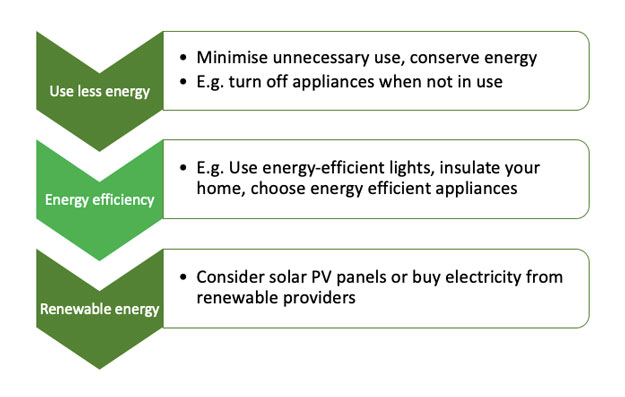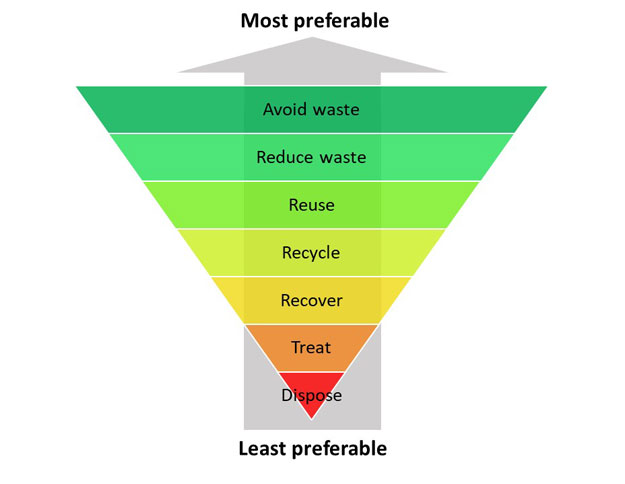How to Live Sustainably
Sustainable living is a lifestyle that reduces a person‘s or society’s use of Earth’s natural resources. Being sustainable makes sense. It can improve health, increase safety, and save money. For example, driving less reduces air pollution, decreases wear and tear on local roads, and saves money.
Energy efficiency
One way to live sustainably and reduce your carbon footprint is to consider how much energy you use and where it comes from.
How to make your home energy efficient and reduce your carbon footprint:

Useful resources
- Mosman Sustainability Events and Workshops
- Australian Government: Energy made easy
- Energy Saver – NSW Govt
- Zero Emissions Sydney North is a local community group formed to take action on climate change. Their website includes information for reducing household greenhouse gas emissions and solar information evenings (or videoconferences). They have also created a video with tips for reducing your pool pump electricity bill.
Solar/renewable energy
Transitioning to renewable energy (e.g. solar) reduces greenhouse gas emissions because of Australia’s reliance on fossil fuel for electricity generation. Consider installing solar PV panels on your home or changing to a renewable electricity provider.
In Mosman, the installation of solar panels or photovoltaic cells for generating electricity and heating water is classified as ‘Exempt Development’ and in most cases does not require Council approval provided that certain basic requirements are met.
A summary of the ‘Exempt Development’ requirements for installing solar panels is provided below:
- The system is integrated into the building or is flush or parallel with the surface of its roof; and
- The development does not reduce the structural integrity of, or involve structural alterations to, the building; and
- The development does not necessitate the removal of trees from near the building to ensure that solar energy is available for the system; and
- On average, over any 5 year period, at least 75 per cent of the electricity generated by the system in a 12 month period is used in or for the building; and
- The system is not located on a building that is a State or local heritage item or is in a heritage conservation area.
Further advice can be obtained from Council’s Development Advisor who is available for public consultation between the hours of 8.30am – 10.30am, Monday to Friday or by phone – 9978 4172.
Solar installation made easy
Mosman Council has put together an informative guide to help you understand how to install solar panels on domestic houses. This guide outlines the process so you know what issues need to be considered, and gives helpful links to legitimate and authoritative information.
Useful resources
- Mosman Sustainability Events and Workshops
- SunSPoT is a free tool to help homeowners understand the benefits and costs of installing solar panels using a satellite map
- The Clean Energy Council’s Guide to Installing Solar PV for Households steps homeowners through the process of purchasing and installing rooftop solar panels
- Further local information on how to install solar can also be found from Zero Emissions Sydney North
ClimateClever app
Council has partnered with ClimateClever to help residents reduce their household energy consumption. The Climate Clever App is free for home and school users to sign up.
A product of research at the Curtin University Sustainability Policy Institute, the ClimateClever app enables users to measure and monitor their environmental impact through electricity, gas and water consumption, and provides an action plan on how to be more energy efficient, and reduce emissions and utility bills.
ClimateClever works in three simple steps:
- Measure – Calculate carbon footprint and track consumption, emissions and costs.
- Audit – Understand how the home or school consumes resources, and how this contributes to carbon footprint and utility costs.
- Action – Create a custom action plan to systematically reduce resource consumption, emissions and utility bills.
For residents
Mosman residents are invited to subscribe to the ClimateClever Homes app. For more information and to subscribe follow this link.
For schools
Mosman schools are invited to subscribe to ClimateClever. Schools using ClimateClever typically save at least 10% on utility costs, and the app links carbon reduction initiatives to the curriculum and enables action based learning. A subscription comes with teaching resources, opportunities to connect with other ClimateClever schools, comparison data and progress reports. For more information and to subscribe follow this link.
HomeEnergySaver videos
Council partnered with Your Energy Friend to produce a series of short videos introducing energy efficiency topics for the community.
Be water wise
We all know water is our most precious resource – let‘s do our best to conserve water.
Another way to live sustainably is to reduce the amount of water you use, in and around the home. As more than 85% of Greater Sydney’s water supply relies on rain, our water is in short supply during prolonged droughts. Water restrictions apply to everyone in Sydney: this includes both residents and businesses. If we all do our bit we will make a big difference across Greater Sydney.
Adhere to the current water restrictions put in place and enforced by Sydney Water.
There are many ways to save water (and reduce your water bill) around the home and in the garden, at little or no cost. Sydney Water provides tips on how to be water wise and recommends simple things you can do in your home and garden to save water. See Sydney Water‘s website for more information.
Council’s consultant Manly Hydraulics Lab (MHL) recently installed a rainfall gauge at Mosman Bowling Club. Residents can view a webpage which displays rainfall data collected over the previous seven days.
Food and garden
Sustainable food choices are healthy for our bodies and the environment. This means foods that provides a balanced diet for the body but also are produced in a way that does not harm the environment.
Tips for eating sustainably
- Eat seasonally and buy local. Freshly picked Australian produce is more nutritious. Transporting food across long distances burns fossil fuels and emits greenhouse gases. By buying from local markets, it not only reduces the fossil fuel use and greenhouse gases, it also supports your local economy.
- Grow your own food. Growing fresh fruit, herbs and vegetables at home is fun, healthy and doesn’t require much room. When you grow your own food, you cut the need to transport food using trucks that emit greenhouse gases. Seasonal planting for Sydney conditions will help you have a successful crop. The ABC has a useful guide for seasonal planting in Sydney.
Useful resources
- Compost Bins and Worm Farms – A limited offer is available to Mosman residents who would like to order one compost bin and stirrer. Enter the coupon code “2020” at the Compost Revolution checkout tab to receive your Dirt Vader + Revolver for $20 + FREE shipping! Only one order /household accepted.
- Living Mosman Events and Workshops
- Community Gardening
Avoid and reduce food waste
When our food ends up in a landfill, it can‘t decompose naturally and it releases methane, a greenhouse gas that is detrimental to the environment and contributes to climate change. To reduce waste to landfill Council provides community education and workshops. We are continually researching new ways of diverting waste and developing strategies to minimise waste.
The Waste Hierarchy below demonstrates the most preferable (and most sustainable) option for waste. Most preferable is to avoid waste altogether. If it is impossible to avoid generating waste the next option is to reduce waste and so on, with disposing of waste in landfill as the least preferable option.

Transport
Living sustainably means considering how your mode of transport affects your carbon footprint.
Council is committed to encouraging the community to use sustainable modes of transport. Find information and maps to get you moving, back on your bike, enjoying your local area and meeting people and safely getting you around.